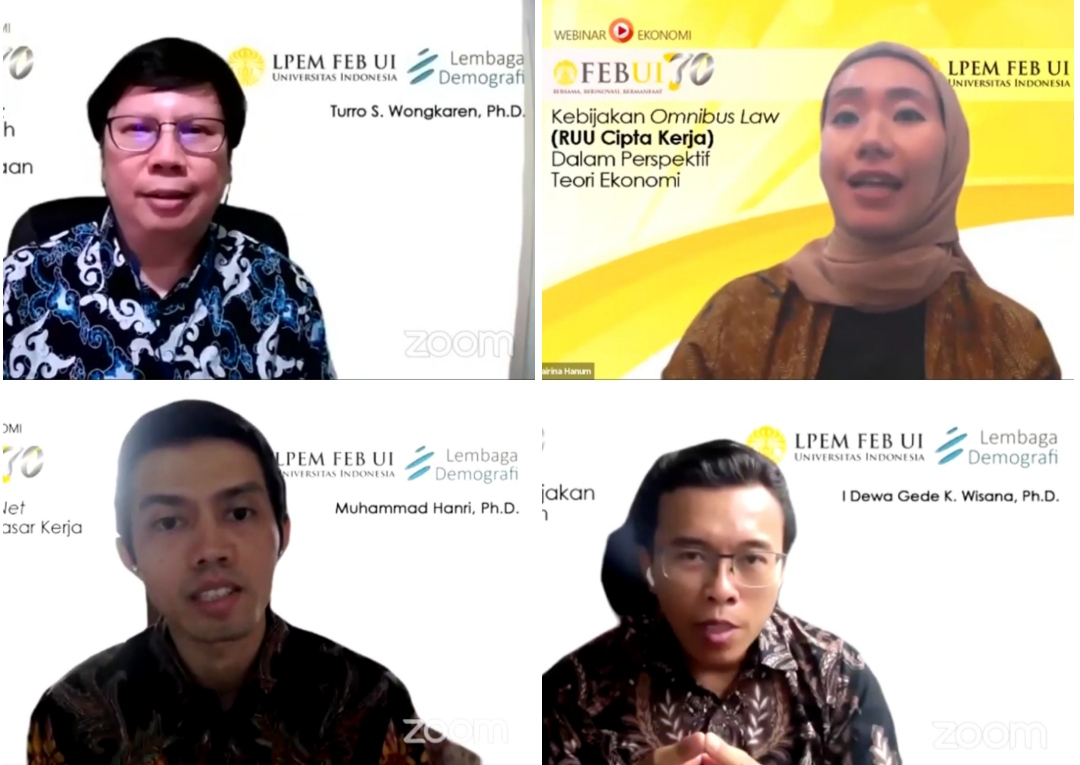LD and LPEM FEB UI’s Webinar: “Omnibus Law – Job Creation Bill from the Perspective of Economics
Nino Eka Putra ~ FEB UI Public Relations Officer
DEPOK – (11/9/2020) The Demography Institue (LD) collaborated with the Economic and Community Research Institute (LPEM), Faculty of Economics and Business, Universitas Indonesia, to hold an economic webinar entitled “Omnibus Law: Job Creation Bill from the Perspective of Economics”, on Friday (11/9/2020). The webinar was part of a series of activities held to mark FEB UI’s 70th anniversary.
The panelists at the webinar were Turro S. Wongkaren, Ph.D., head of LD FEB UI, I Dewa Gede Karma Wisana, Ph.D., deputy head of LD FEB UI, and Muhammad Hanri, Ph.D., LPEM FEB UI researcher. The webinar was moderated by Chairina Hanum.
The first panelist, Turro S. Wongkaren, said that the current situation is marked by competition among countries, the fourth industrial revolution (Industry 4.0), changes in the job market and the Covid-19 pandemic. Before the outbreak of the pandemic, in February 2020, the number of Indonesia’s job seekers stood at 138 million while the number of jobs available was 132 million. This means 6 million people were unemployed. The number of unemployment is expected to increase to 9 million in 2025, 5 million of them people aged 30 years old. Nearly one million of the unemployed previously studied at university and around 3.7 million are high school/vocational school graduates.

Work is a basic human need in meeting their daily needs. Law Number 13 Year 2003 concerning Employment should be renewed because today’s condition is vastly different from the condition 17 years ago (2003) due to, among other things, population change, the economic crisis in 2008 and 2020, changes in the job market (nature of work has changed), and the social security (BPJS). Labor protection should be based on talent/manpower management that is related to the economy, namely enabler, attraction, growth, retention, vocational skills and global knowledge.
“Thus, the job creation bill could be a solution to anticipate the demographic bonus Indonesia will experience between 2020 and 2039, considering that the bonus could become either an opportunity or a threat. In addition, 67% of Indonesia’s population is in the productive age group. The job creation bill is expected to absorb job seekers from this group, otherwise the demographic bonus will become a demographic disaster. To promote the job creation bill, the government should involve all related parties to sit together and discuss the bill in great details. This will minimize polemic,” said Turro.
The second panelist, I Dewa Gede Karma Wisana, pointed out that more than half of workers are contract workers or workers who work based on verbal agreements without adequate social protection. In addition, informal workers, such as those working in areas related to digital platforms, are not protected by law. Meanwhile, traditional informal workers are not protected by the employment law. Basically, all workers should have the right to welfare, health, unemployment insurance, and retirement fund for workers not related to a single platform.

“Any regulation in whatever form should be adjusted to market reality that continues to change. The Internet and digital technology development have reduced the cost of finding a job, eliminate information asymmetry, ensure better price transparency and the inclusion of the informal sector. To deal with the fast changes, regulations should regulate either in a major way or periodically,” said Dewa.
The third panelist, Muhammad Hanri, said that during the Covid-19 pandemic, the number of layoffs has increased, particularly among workers in the formal sector. The government has issued a regulation on the amount of severance pay for workers who are made redundant. On the one hand, the workers have an alternative to use up their retirement fund. There has been an increase in the number of withdrawal of retirement fund among workers aged 20-30 years old. However, the withdrawal of the retirement fund means they risk their welfare when they reach retirement age and will be a burden to the government in the future. This is also true with the discourse on the proposal to add unemployment insurance (Jaminan Kehilangan Pekerjaan, JKP) to BP Jamsostek’s program in the job creation bill.

A study on unemployment insurance (UI) showed that in other countries, the insurance affects workers’ productivity in terms of passion for work based on expertise and increases workers’ contribution and working spirit. On the other hand, there is a moral hazard. When workers lose their job, they know that they will be covered by the unemployment insurance and will not make serious efforts to find new jobs, thus reducing productivity.
In terms of poverty, the alternative income from the unemployment insurance will force workers to adjust their consumption patterns between jobs to avoid falling into poverty. If the unemployment insurance is equivalent to the minimum wage and workers delay finding new jobs, they will risk falling into poverty. The main indicators that should be considered to determine the amount of the unemployment insurance are, among other things, job characteristics, the amount of minimum wage, the availability and demand for skills. (hjtp)
(lem)





